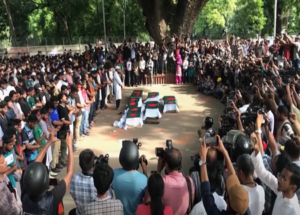Image source-SAJ files
Touted as the world’s biggest democracy, it is not necessarily seen as a blessing in the neighborhood. The expansion of Hindutva and suppressing the minorities, especially the Muslims, has been a trademark India’s neighbors can feel every day.
India was partitioned in a hurry in 1947 by Great Britain, causing fissures in the boundaries of the two nations born out of religious animosities. Both Hindus and Muslims can blame each other for the root causes, but it is accepted that the British policy of “divide and rule” played a significant part in this division.
The common rivers shared by the South Asian region have been used to punish the lower riparian nations from water in the dry seasons and to flood them by spilling their barrages during rainy seasons. India freely exercises the theory of Chanakya to their advantage. Pakistan, Afghanistan, Nepal, Kashmir, Sikkim, Bhutan, Bangladesh, Sri Lanka, and the Maldives have all gone through Indian hegemony over the years.
The recent student uprising in Bangladesh eventually became a nationwide rejection of the regime controlled and dictated by Delhi. In Bangladesh, India practiced something similar to what it did to acquire Sikkim a few decades ago. The neighborhood is too familiar with Indian interventions based on Chanakya’s Brammanical diplomacy.
While Bangladeshis were reeling from the ruthless rule of the Hasina regime, the oligarch-controlled Indian media was on the offensive against the Bangladeshi people. They created stories of minority oppression in Bangladesh, citing unrelated images and videos. The interim government headed by Professor Yunus, a Nobel laureate, handled this ugly situation eloquently. Indian political commentators and the media fomented rumors that Bangladesh is heading toward talibinization or Islamic fundamentalism. There were no comments about the killing of hundreds of young students by the regime in Dhaka.
On August 5, when her government fell, Hasina fled to India by helicopter from the Prime Minister’s palace to a military base and then by a C130 troop carrier to Delhi. Since then, she has been a guest of the Indian government.
Hasina might seek asylum or refugee status in India, especially if returning to Bangladesh poses significant risks to her safety. India would then face a difficult decision on whether to grant asylum, balancing international law with its diplomatic interests and the broader implications for bilateral relations with Bangladesh. India has not enacted a dedicated asylum law or signed the 1951 United Nations Refugee Convention or its 1967 Protocol. As a result, no formal legal framework explicitly governs the granting of asylum. However, Asylum decisions in India are typically made case-by-case by the government. This allows flexibility and means that political, diplomatic, and strategic considerations can influence decisions.
Bangladesh and India have a bilateral extradition agreement, which could further complicate matters if Sheikh Hasina were to be convicted of crimes related to human rights abuses. These include allegations of extrajudicial killings, enforced disappearances, killings and maiming of protesting students, and the illegal detention and torture of individuals in secret facilities like Ayna Ghor. Should Bangladesh formally request her extradition to face charges for these crimes, India would find itself in a delicate position.
Refusing the request to extradite Hasina for her crimes could damage India’s standing in the international community, particularly among countries and organizations advocating for human rights and justice. This dilemma would force India to weigh its strategic interests against legal obligations and the potential backlash from domestic and international actors.
Bangladesh finds itself in a crucial position. Great powers like the USA, China, and India are trying to control Bangladesh to gain a strategic advantage. The hardworking Bangladeshis trying to propel their nation economically face roadblocks from hegemons with their designs. The only way out is to stabilize law and order and form a viable democratic government free of foreign yokes. Professor Yunus has a tremendous weight on his shoulders, and steering Bangladesh to safety and prosperity would be his last challenge, which he may find more difficult than achieving a Nobel prize.


